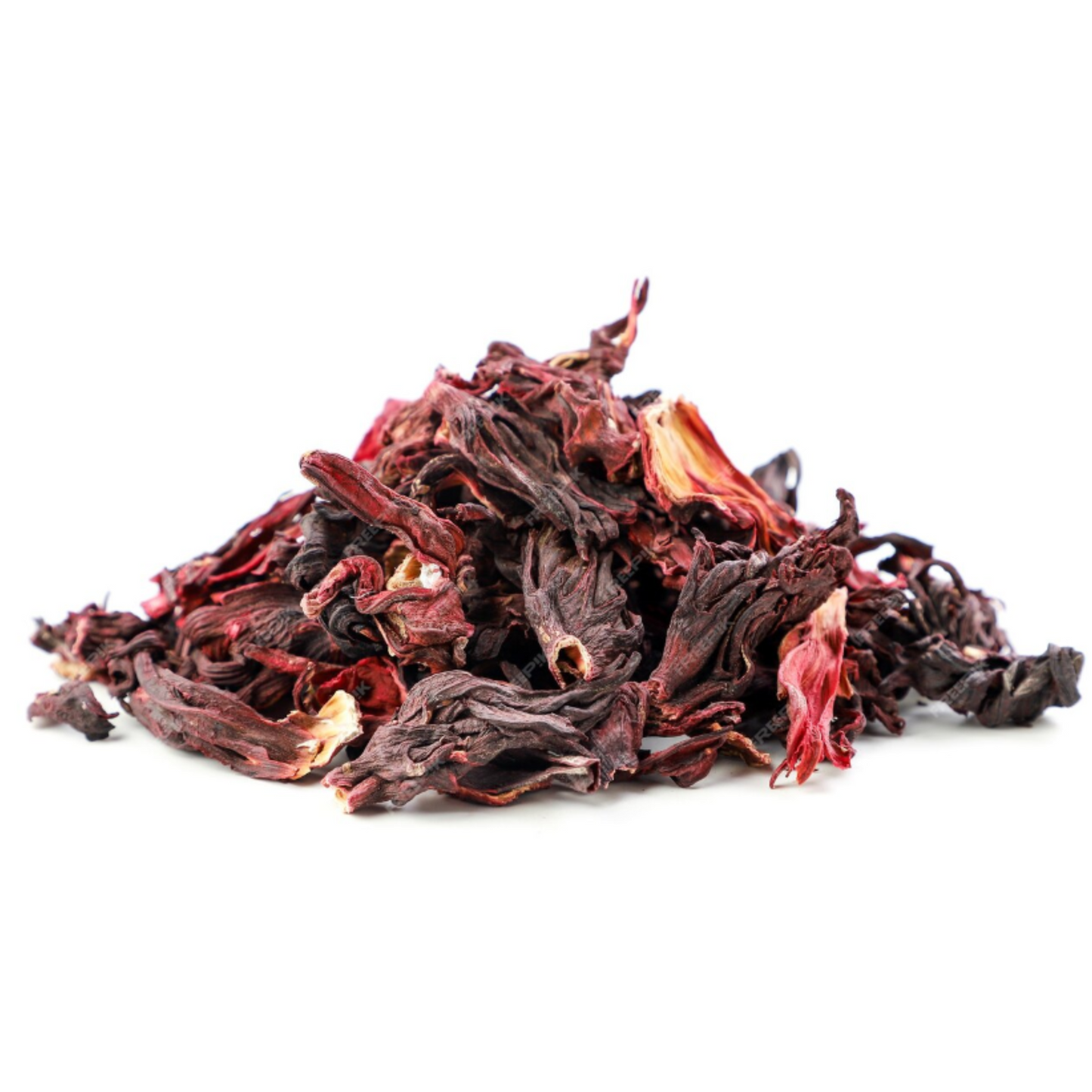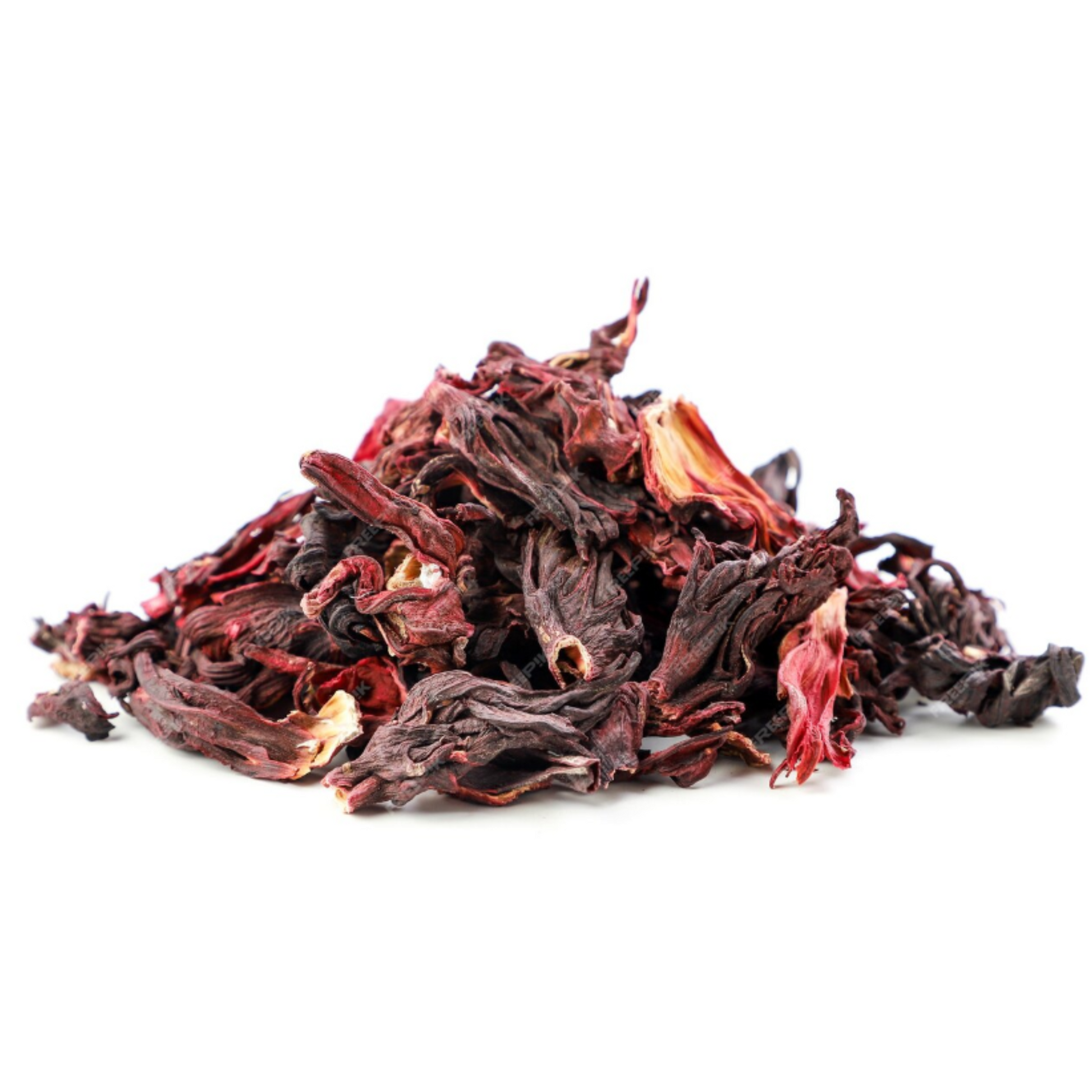Hibiscus Tea Dried Flowers (Hibiscus sabdariffa)
Hibiscus Tea Dried Flowers (Hibiscus sabdariffa)
Couldn't load pickup availability
Hibiscus is a medicinal plant that can be consumed as a tea and is known for being rich in anthocyanins, which are responsible for its characteristic red color, antioxidant properties and the numerous benefits it provides to human health.
Ingredients
Ingredients
Dried Hibiscus Flowers (Calyces): This is the main ingredient, providing the distinctive red color and tangy flavor.
Benefits
Benefits
Hibiscus tea, made from the dried petals of the Hibiscus sabdariffa plant, has become a popular drink for health-conscious individuals, and for good reason. This refreshing tea is not only caffeine-free but also packed with numerous health benefits. Whether you're new to Hibiscus tea or already a fan, this guide will cover everything you need to know about its benefits, how to make it, and tips on enjoying it daily.

Health Benefits of Hibiscus Tea
-
Lowers Blood Pressure: One of the most well-known benefits of Hibiscus tea is its ability to lower blood pressure. Several studies, including one published in The Journal of Nutrition, have found that drinking Hibiscus tea can reduce systolic blood pressure in adults with prehypertension and mild hypertension. This makes it a great natural remedy for those looking to manage their blood pressure without medication.
-
Rich in Antioxidants: Hibiscus tea is loaded with antioxidants, which help protect your body against free radical damage. These antioxidants can reduce inflammation and protect against chronic diseases, such as heart disease and cancer.
-
Supports Weight Loss: Some research suggests that Hibiscus tea can help with weight management. A study published in the Journal of Ethnopharmacology found that Hibiscus extract reduced body weight, body fat, and hip-to-waist ratio in overweight participants.
-
Promotes Liver Health: Hibiscus tea may also promote liver health by enhancing the liver's ability to detoxify the body. Studies have shown that Hibiscus extract has hepatoprotective effects, helping to prevent liver damage caused by toxins.
-
Improves Digestion: If you're looking for a natural way to improve digestion, Hibiscus tea may help. It has been used in traditional medicine to treat digestive issues like constipation and bloating, thanks to its diuretic and mild laxative effects.
-
Helps Manage Cholesterol Levels: Drinking Hibiscus tea may help lower LDL cholesterol and triglycerides, reducing the risk of heart disease. Research has shown that it can have a positive effect on lipid profiles, particularly in people with diabetes.
-
Boosts the Immune System: Thanks to its high vitamin C content, Hibiscus tea can strengthen the immune system, helping you fight off colds and infections more effectively.
For more detailed information on the health benefits of Hibiscus tea, you can explore studies available on NCBI here.
How to Make Hibiscus Tea
Making Hibiscus tea is simple, and you can enjoy it hot or cold, depending on your preference.
Ingredients:
- 2 tablespoons of dried Hibiscus petals (you can find these in health food stores or online)
- 4 cups of water
- Sweetener to taste (optional)
- Optional: cinnamon stick, lime, or mint for extra flavor
Instructions:
- Bring 4 cups of water to a boil.
- Add the dried Hibiscus petals to the boiling water and remove the pot from heat.
- Let the petals steep for about 5-10 minutes, depending on how strong you want your tea.
- Strain the tea into a pitcher or teapot, discarding the petals.
- Sweeten to taste with honey or stevia, if desired. You can also add a cinnamon stick or a slice of lime for extra flavor.
- If you prefer iced tea, let the Hibiscus tea cool to room temperature before refrigerating. Serve over ice with a sprig of mint.
This basic recipe can be adjusted to suit your tastes. Feel free to experiment with other herbs and spices to create your unique blend!
Precautions and Side Effects
While Hibiscus tea is generally safe for most people, there are a few precautions to keep in mind:
- Pregnancy: Pregnant women should avoid Hibiscus tea as it can induce menstruation and potentially cause complications.
- Medication Interactions: If you are on medication for high blood pressure or diabetes, consult your doctor before adding Hibiscus tea to your routine, as it can enhance the effects of these medications.
- Low Blood Pressure: If you already have low blood pressure, drinking Hibiscus tea might lower it too much.

How to Use Hibiscus Tea
Hibiscus tea can be enjoyed as a daily beverage, either as a morning refresher or an evening relaxant. For health benefits, drinking 2-3 cups per day is recommended, but always start with small amounts to see how your body reacts.
Here are a few ideas on how to use Hibiscus tea:
- As a Base for Other Drinks: Mix Hibiscus tea with lemonade or iced green tea for a refreshing twist.
- In Smoothies: Use cooled Hibiscus tea as a liquid base for smoothies.
- In Desserts: Infuse Hibiscus tea into syrups or use it to flavor cakes and pastries.
What is Hibiscus Tea Good For?
To summarize, Hibiscus tea is an excellent natural remedy for managing blood pressure, supporting liver health, aiding weight loss, and boosting your immune system. Its vibrant color and tart flavor make it a delicious and versatile addition to your daily routine.

Hibiscus tea can strengthen the immune system, helping you fight off colds and infections more effectively.
FROM OUR BLOG
News from Nature Wealth
Do you like surprises? Join Here
We will only share with you the simplicity of the ingredients and the fantastic discoveries that we receive from Mother Nature.


